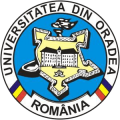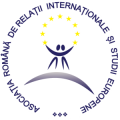Key staff member
Lecturer, member of the department of International Relations and European Studies at the University of Oradea. Member of the Institute for Euroregional Studies and the Romanian Association of International Relations and European Studies.
As part of the experience in working with European funds and also local and Euroregional funds, project manager in 5 projects of which: The Evaluation of Cross Border Cooperation at the frontiers of EU – Jean Monnet Module, www.evalcbc.eu; Developing competences in the field of public administration, in partnership with the University of Reims Champgne Ardenne, financed by the European Commission through the Lifelong Learning Policy; Building a future together: Urban aglomeration Debrecen – Oradea – 700 000 (2020) financed by the Oradea City Hall and other 15 participations as project member of which we mention Boosting Innovation through Capacity Building and Networting of Science Centre in the SEE Region.
Member of the editorial staff for Eurolimes, Romanian International Relations and European Studies Journal, Romanian Security Studies Journal. Scientific contribution can be attested by over 40 articles presented at international conferences and published in books and journals indexed in international data bases, 2 personal books published and 3 coordinated books. The area of interest and research is concentrated in the following fields: cross border cooperation, evaluation of programs and European public policy, international organisations, European institutions and policies, communication and negotiation, international relations sociology.
Relevant publication
Achievements, Contemporary Approaches and Perspectives in the Evaluation of Cross-border Cooperation (in collaboration with Ioan Horga and Luminița Șoproni), Debrecen University Press, Debrecen, ISBN 978-963-318-694-7, 295p., 2017
Abstract: The cross-border space represents an interesting topic for study, as the combination of elements that make up this space provide researchers with case studies aimed at generating solutions to more than one national community that lives near to the area. The cross-border solutions improve the quality of life for people in neighbouring communities, develop cooperation between institutions, promote sustainable development and reduce discrepancy among regions. These objectives are connected with those of the Europe 2020 strategy that underline opportunities for new jobs, research and education, reduction in poverty as well as sustainable climate and energy solutions. Cross-border cooperation evaluation successfully combines two relevant dimensions of European studies: cross-border cooperation and the evaluation method, with its specific steps and instruments, thus creating a new direction for study and research. The context outlined above has provided us with the prerequisites for achieving this volume, dedicated to the different facets of cross-border cooperation and its modalities and assessment tools.
The Evaluation of Cross-Border Cooperation in Europe (in collaboration with Ioan Horga, Luminița Șoproni), Debrecen University Press, Debrecen, ISBN 978-963-473-961-6, 266p, 2017
Abstract: The European integration implies the fulfilment of several categories of criteria: some imposed by the European institutions; others stemming from the historical and cultural tradition and evolution of the nations of the Old Continent. This way, the economic, political and legal norms combine with the democratic and cultural values promoted throughout the entire European construction. The volume encompasses the complex system of norms and values that is in fact the European identity that ensures regional cohesion, but at the same time determines the fragility of the links between its members and the functional imbalances (caused by incompatibilities, overlaps or even contradictory discourses and actions of the regional or state actors).
The Frontier – from Boundary to Connecting Axis for Cross-Border Regions (in collaboration with Ioan Horga and Luminița Șoproni), in ”The Evaluation of Cross-Border Cooperation In Europe”, Eds. Constantin Vasile Țoca, Ioan Horga, Luminița Șoproni, Debrecen University Press, ISBN 978-963-473-961-6, pp. 7-14, 2017
Abstract: The role and functions of frontiers have continually changed, under the influence of several factors: the economic orientation that governed international relations, the interests of the actors of the world economy, the inability of states to exercise their role of stabilizing and maintaining economic and trade policies, or the need for states and regions to integrate into the global economy to access resources to achieve development and growth. Thus, in addition to the classical barrierdimension, borders acquire meanings of bonds, resources or symbolsof identity, each of these dimensions being present in varying proportions depending on the type of the border being analysed or the type of region it delimits.
The Impact of Romania – Hungary Cross Border Cooperation Programme 2007-2013 on Bihor-Hajdu Bihar Counties (in collaboration with Eduard Ionut Feier and Alexandra Radu), in ”The European Space. Borders and Issues”, Mircea Brie, Florentina Chirodea, Alina Stoica (eds.), Debrecen University Press, Debrecen, ISBN 978-963-319-609-4, pp. 489-502, 2016
Abstract: This paper aims to assess the impact of Romania-Hungary Territorial Cooperation Operational Programme 2007-2013 on the two neighbouring countries modelled on the idea of objective-related evaluation. The ex post analysis will also be employed as a research tool, in order to observe the positive outcomes of the program for Bihor and Hajdu Bihar counties.
Cross Border Cooperation and Evaluation of the Eastern Partnership Territorial Cooperation Programme between Romania-Moldova-Ukraine (in collaboration with Bogdan Pocola, Alexandra Radu), in ”EU Relations with Eastern Pertnership: Strategy, Opportunities and Challenges”, edited by Carlos E Pacheco Amaral, Gaga Gabrichidze, Ioan Horga, Anatoly Kruglashov, Ewa Latoszek, Marta Pachocka, Vasile Cucerescu, Print Caro Press House, Chișinău, ISBN 978-9975-56-364-2, pp. 245-261, 2016
Abstract: The concept of cross-border cooperation has undergone changes in recent years given the way regional and European politics have understood and shifted regional policy. There has been a shift after the rapid expansion of the EU during the last 15-20 years, a change that has prompted newer member states to concentrate more on integration rather than bringing in new members. Evaluating cross-border programmes at the eastern borders of the EU is a result of these changes as well as structural and funding shifts due to entering the new budget cycle of 2014-2020.
European Border Cities as Cross-border Cooperation Engines, in Eurolimes 19/2015, Oradea University Press, pp.5-16 Abstract: The border cities from a new and very interesting perspective for the former communist countries: that of de-marginalisation of the border urban areas, of an upgrading of the status of peripheral regions, and, in the end, of the dynamisation of their economic and cultural life by their very easy to establish external relations in the framework of the process of cross-border cooperation. In the context of the greater consideration allotted to the problem of borders and cross-border cooperation in the EU, the role of the border cities could be considered as an act of reparation to these urban areas, to their ethnic diversity, multicultural sophistication, political role in key situations, or economical potential for their communities and even region or country.






